Reza Yousefi Maragheh
MetaSynth: Multi-Agent Metadata Generation from Implicit Feedback in Black-Box Systems
Oct 01, 2025Abstract:Meta titles and descriptions strongly shape engagement in search and recommendation platforms, yet optimizing them remains challenging. Search engine ranking models are black box environments, explicit labels are unavailable, and feedback such as click-through rate (CTR) arrives only post-deployment. Existing template, LLM, and retrieval-augmented approaches either lack diversity, hallucinate attributes, or ignore whether candidate phrasing has historically succeeded in ranking. This leaves a gap in directly leveraging implicit signals from observable outcomes. We introduce MetaSynth, a multi-agent retrieval-augmented generation framework that learns from implicit search feedback. MetaSynth builds an exemplar library from top-ranked results, generates candidate snippets conditioned on both product content and exemplars, and iteratively refines outputs via evaluator-generator loops that enforce relevance, promotional strength, and compliance. On both proprietary e-commerce data and the Amazon Reviews corpus, MetaSynth outperforms strong baselines across NDCG, MRR, and rank metrics. Large-scale A/B tests further demonstrate 10.26% CTR and 7.51% clicks. Beyond metadata, this work contributes a general paradigm for optimizing content in black-box systems using implicit signals.
The Future is Agentic: Definitions, Perspectives, and Open Challenges of Multi-Agent Recommender Systems
Jul 02, 2025Abstract:Large language models (LLMs) are rapidly evolving from passive engines of text generation into agentic entities that can plan, remember, invoke external tools, and co-operate with one another. This perspective paper investigates how such LLM agents (and societies thereof) can transform the design space of recommender systems. We introduce a unified formalism that (i) models an individual agent as a tuple comprising its language core, tool set, and hierarchical memory, and (ii) captures a multi-agent recommender as a triple of agents, shared environment, and communication protocol. Within this framework, we present four end-to-end use cases-interactive party planning, synthetic user-simulation for offline evaluation, multi-modal furniture recommendation, and brand-aligned explanation generation-each illustrating a distinct capability unlocked by agentic orchestration. We then surface five cross-cutting challenge families: protocol complexity, scalability, hallucination and error propagation, emergent misalignment (including covert collusion), and brand compliance. For each, we formalize the problem, review nascent mitigation strategies, and outline open research questions. The result is both a blueprint and an agenda: a blueprint that shows how memory-augmented, tool-using LLM agents can be composed into robust recommendation pipelines, and an agenda inviting the RecSys community to develop benchmarks, theoretical guarantees, and governance tools that keep pace with this new degree of autonomy. By unifying agentic abstractions with recommender objectives, the paper lays the groundwork for the next generation of personalized, trustworthy, and context-rich recommendation services.
Seller-side Outcome Fairness in Online Marketplaces
Dec 06, 2023

Abstract:This paper aims to investigate and achieve seller-side fairness within online marketplaces, where many sellers and their items are not sufficiently exposed to customers in an e-commerce platform. This phenomenon raises concerns regarding the potential loss of revenue associated with less exposed items as well as less marketplace diversity. We introduce the notion of seller-side outcome fairness and build an optimization model to balance collected recommendation rewards and the fairness metric. We then propose a gradient-based data-driven algorithm based on the duality and bandit theory. Our numerical experiments on real e-commerce data sets show that our algorithm can lift seller fairness measures while not hurting metrics like collected Gross Merchandise Value (GMV) and total purchases.
LLM-TAKE: Theme Aware Keyword Extraction Using Large Language Models
Dec 01, 2023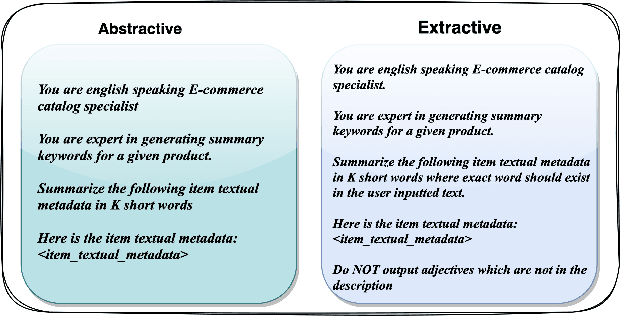
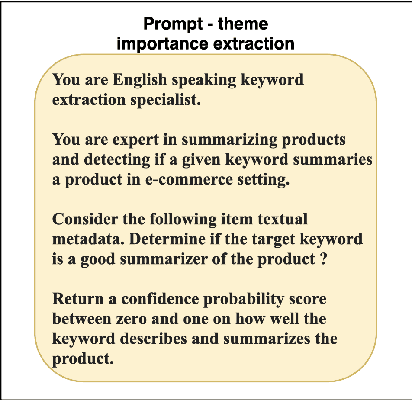
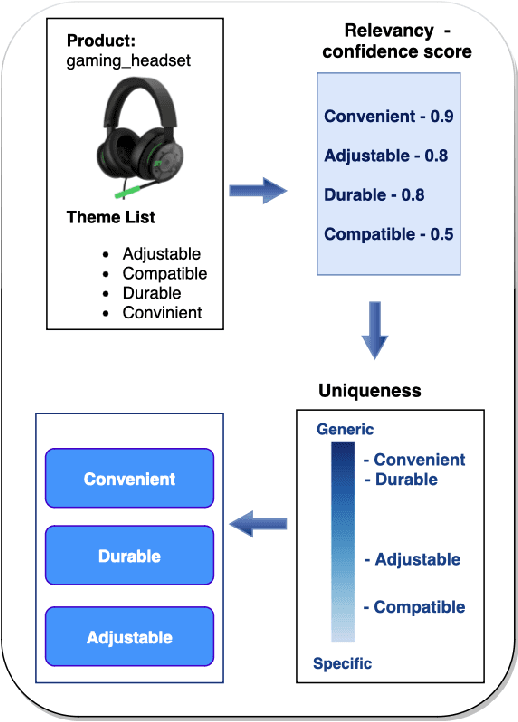
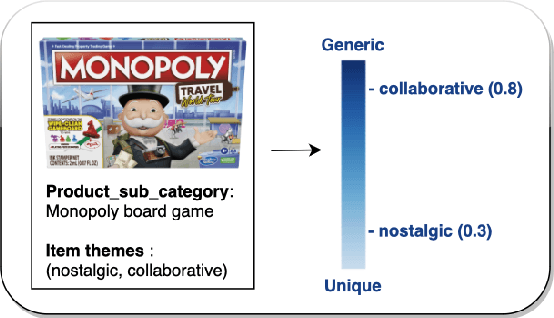
Abstract:Keyword extraction is one of the core tasks in natural language processing. Classic extraction models are notorious for having a short attention span which make it hard for them to conclude relational connections among the words and sentences that are far from each other. This, in turn, makes their usage prohibitive for generating keywords that are inferred from the context of the whole text. In this paper, we explore using Large Language Models (LLMs) in generating keywords for items that are inferred from the items textual metadata. Our modeling framework includes several stages to fine grain the results by avoiding outputting keywords that are non informative or sensitive and reduce hallucinations common in LLM. We call our LLM-based framework Theme-Aware Keyword Extraction (LLM TAKE). We propose two variations of framework for generating extractive and abstractive themes for products in an E commerce setting. We perform an extensive set of experiments on three real data sets and show that our modeling framework can enhance accuracy based and diversity based metrics when compared with benchmark models.
GNN-GMVO: Graph Neural Networks for Optimizing Gross Merchandise Value in Similar Item Recommendation
Oct 26, 2023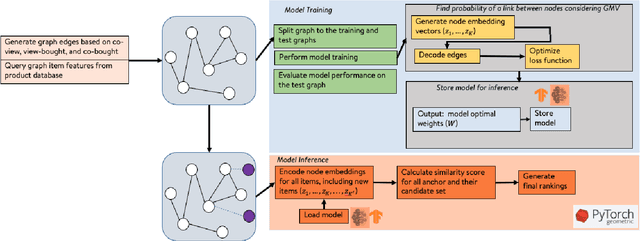

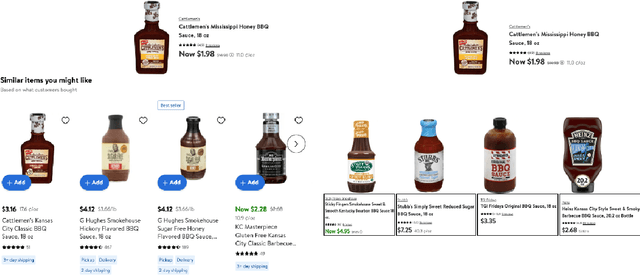

Abstract:Similar item recommendation is a critical task in the e-Commerce industry, which helps customers explore similar and relevant alternatives based on their interested products. Despite the traditional machine learning models, Graph Neural Networks (GNNs), by design, can understand complex relations like similarity between products. However, in contrast to their wide usage in retrieval tasks and their focus on optimizing the relevance, the current GNN architectures are not tailored toward maximizing revenue-related objectives such as Gross Merchandise Value (GMV), which is one of the major business metrics for e-Commerce companies. In addition, defining accurate edge relations in GNNs is non-trivial in large-scale e-Commerce systems, due to the heterogeneity nature of the item-item relationships. This work aims to address these issues by designing a new GNN architecture called GNN-GMVO (Graph Neural Network - Gross Merchandise Value Optimizer). This model directly optimizes GMV while considering the complex relations between items. In addition, we propose a customized edge construction method to tailor the model toward similar item recommendation task and alleviate the noisy and complex item-item relations. In our comprehensive experiments on three real-world datasets, we show higher prediction performance and expected GMV for top ranked items recommended by our model when compared with selected state-of-the-art benchmark models.
 Add to Chrome
Add to Chrome Add to Firefox
Add to Firefox Add to Edge
Add to Edge